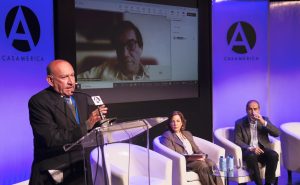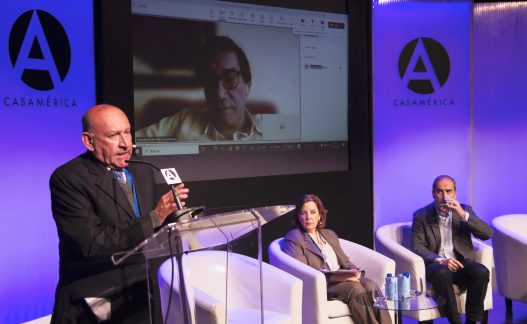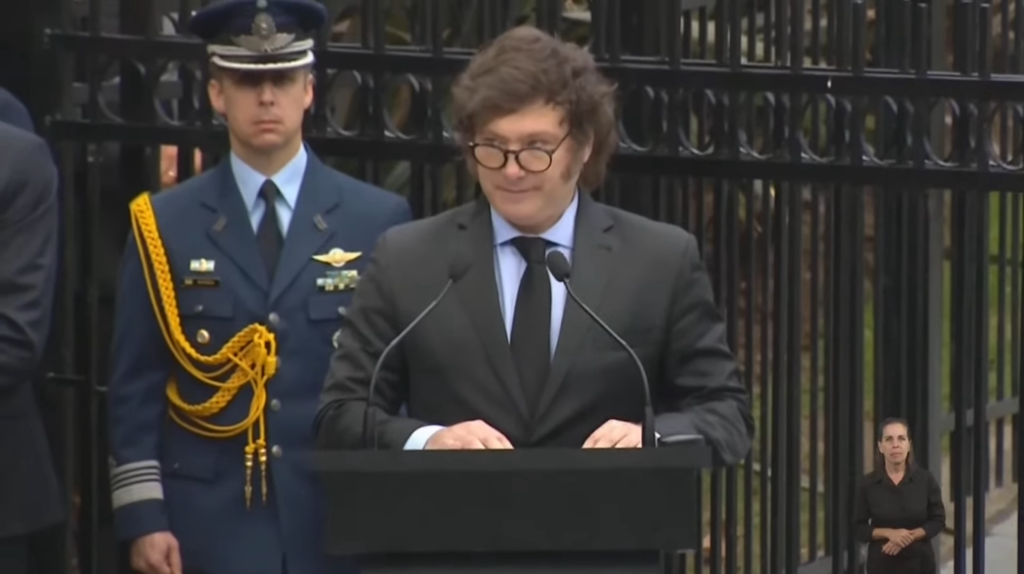
ETHICS IN JOURNALISM, THE BUZZING OF A BLOWFLY THAT FLIES AMONG GALE FORCE WINDS
Jaime Abello, general director of the Gabo Foundation, recalled that it was in 1995 when Gabriel García Márquez launched his well-known phrase: “Ethics is not an occasional condition, but must always accompany journalism like the buzzing of a blowfly”.
The buzzing is immovable to the blowfly, but the sky in which it flies is no longer the same.
Abello, together with María Luisa Humanes, professor of Communication at the Universidad Rey Juan Carlos, and Alfonso Sánchez-Tabernero, former rector and professor of Communication Business at the University of Navarra, outlined this new scenario in which journalistic ethics is developing and shed light on how to navigate it without getting lost.
They did so in the panel called Ethics and journalistic responsibility, which was moderated by Venezuelan journalist Elides Rojas. It was one of the eight forums that took place at the Congress of Media Editors of the European Union, Latin America and the Caribbean, held from March 18 to 21, 2024 in Madrid and Brussels.
The panel in which the three experts participated took place on March 18, at the Casa de América, in the center of Madrid. In this video of Canal Europa you can see a summary of the activities of that day.
A SEA OF MISINFORMATION
For Abello, one of the most important conditions in which communication develops today is the presence of a lot of disinformation, which is generated in a self-interested way, functional to some objective, and which is widely disseminated.
Another very common element, at least in Latin America, is the emergence of autonomous ventures of journalists due to the economic crisis of the mainstream media. There are countless new media, especially digital, in which the role of the editor has been reduced. The editor, understood as the person who, together with the journalists, plans the topics to be published, reviews them and ensures that they comply with the rigorous parameters required by the profession. “The undertaking usually means economic and sometimes ethical sacrifice of the journalist”, explained Abello.
In addition, these journalistic ventures are usually located in places with less protection, which makes their work more difficult and makes them prone to pressures of all kinds.
Another key element is the presence of new actors in the communication ecosystem, non-journalists, who transmit information that, many times, has not passed through the filter of verification or contrast required of a journalist.
AN AUDIENCE THAT IS MOVING AWAY
On her side, María Luisa Humanes presented reports that show that the audience has serious criticisms against the media, among which stand out: lack of suitability, lack of rigor and neutrality, yellow journalism, spectacularization of politics.
These are elements that generate a distancing of the public.
WEAKENED NEWSROOMS
Sánchez-Tabernero noted that between 2000 and 2024, media companies lost two thirds of their revenues, and this has led to the weakening of newsrooms.
This situation has a direct impact on the quality of journalistic work, because it necessarily means less time worked on a subject that is published.
He also pointed out the presence of servile media. “It is one thing for a media to have principles that it defends, an intention, but it is another thing for them to be servile, that is, to serve a master, whoever it may be”.
WHAT TO DO?
“Ethics requires a strong, solid company, because it is capable of saying no to pressure,” said Sánchez-Tabernero.
Abello agreed that “journalistic rigor requires work, investment and time. It is necessary to be clear about this when consolidating companies or launching communications ventures. Finding support for the sustainability of the media, whatever their size, is fundamental.
But, Abello emphasized, without any excuse, “we have the obligation to be better than the disinformers”. And, in that sense, journalists “have to regain the leading role”.
And how can we be better? Strange as it may seem, Sánchez-Tabernero proposes that what must be done is to remove the concept of having red lines regarding what cannot be done in journalism.
“I think it is a mistake to raise the ethics of journalism focusing on what should not be done, what I should not accept as a journalist, how much interference from others seems to me to be enough,” said Sánchez-Tabernero. He explained that when one draws a red line on what is allowed or not allowed, one tends to run that line as far as the situation of the journalist or the media requires. “If I allow myself to contribute a little bit to superficiality, a little bit to polarization, a little bit to deceit… I end up with such careless ethical limits that I will end up allowing anything.”
The academic proposes that, rather, ethics should be viewed under the premise of “how much good I can do” with journalistic work. For example, how much I contribute to the depth of the treatment of issues, to the political depolarization, to present new issues and new actors.
“Good journalism is transparent and intentional,” said Sánchez-Tabernero. He continued, “Journalism is not and should not be neutral. One must take a position because, for example, freedom is better than authoritarianism.”
A PRACTICAL HELP
On the Gabo Foundation’s website, journalists can freely access the Ethics Clinic, where questions about the day-to-day practice of journalism are answered. For example: Should a media outlet refuse to publish an opinion article that defends the armed attack on civilians? Is it ethical to self-censor? How to be transparent about paid content in social networks and digital media?
A search engine will allow you to browse the most recurring topics in this field. There is also the option to search by keywords. Most of the answers were given, at the time, by the renowned Colombian journalist Javier Darío Restrepo (1932-2019), as a function of workshops on ethics that he developed with communicators in Ibero-America.
Or you can write a specific query, through a form that is displayed there. The answers are worked on by experienced journalists Yolanda Ruiz, from Colombia, and Mónica González, from Chile.
THE CHALLENGE OF LISTENING TO AUDIENCES
Humanes pointed out that in order to regain the audience’s trust it is crucial to listen to them. This requires the development of tools that take care of one detail: to listen, especially to those who do not participate in the criticism of the media. Listening to those who are silently distancing themselves, to those who intentionally no longer want to hear the news.
Sánchez-Tabernero, in this regard, considered that most people are sensible, but that the most foolish are the most active in the media. It is the one who writes to the newspaper, the one who gives his opinion on social networks. “One thing is to listen and another is to give a microphone,” Sanchez-Tabernero sentenced, urging the media to listen well to the audience, to understand their implicit demands even in the most offensive messages. And to act accordingly.
Regaining the public’s trust, said Humanes, also means guaranteeing transparency to readers. Being open with them, keeping in touch. Each company or independent media must seek strategies to achieve these key goals.
For Abello, it is essential to be an active part of the public debate, to be open to public conversation on relevant issues. This, he warned, entails risks, for which rules must be established. For example: not allowing anonymity in comments, making clear in which cases the media will delete a reader’s comment.
The media must contribute with transparency, accepting mistakes and being open to criticism and self-criticism. And it must also contribute to the media education of audiences, who are faced with a gigantic offer of information and misinformation.
DO NOT FORGET THE PRINCIPLES
Beyond the constant technological evolution, the massive presence of influencers, interested disinformation, deep fakes and fake news, the basic principles of journalistic ethics are immovable.
Humanes recalled what these principles are:
– Search for the truth
– Based on facts
– Avoid bias
– Avoid polarization
– Seek equity, seek balance
– Respecting sources, the public and fellow journalists
– Act independently, without subservience
– Act with transparency
– Verify the facts
– Do not contribute to hatred
WHAT ABOUT ACTIVISM?
The mainstream media are often criticized for lack of impartiality, of pluralism, they are even accused of being political opponents. Niche media, on the other hand, are often criticized by their audiences for not being sufficiently activist, for not being more impartial. “So that criticism will always be there,” Abello said. “The important thing,” he continued, “is to be clear that journalism is one thing and activism is another, and that it is not wrong to appeal to a journalism committed to certain causes, which are preferentially addressed, but without ceasing to do journalistic work with the rigor that the profession demands.”
ABOUT THE CONGRESS OF EDITORS
The VII Congress of Media Editors of the European Union, Latin America and the Caribbean is an event organized by Grupo Prestomedia with the support of EditoRed, the European Commission and the European Parliament, Telefónica, Iberia and the Community of Madrid, as well as the collaboration of the Universidad Rey Juan Carlos, Turismo de Galicia and Casa de América, and with Prensamedia as editorial partner.
This year, the general theme of the Congress was: “The quality of information and the credibility of the media, guarantees for democracy”. The meeting took place on March 18-19, 2024 in Madrid, Spain, and on March 20-21 in Brussels, Belgium.
————
This text is free to use. If you use it, please cite EditoRed.



